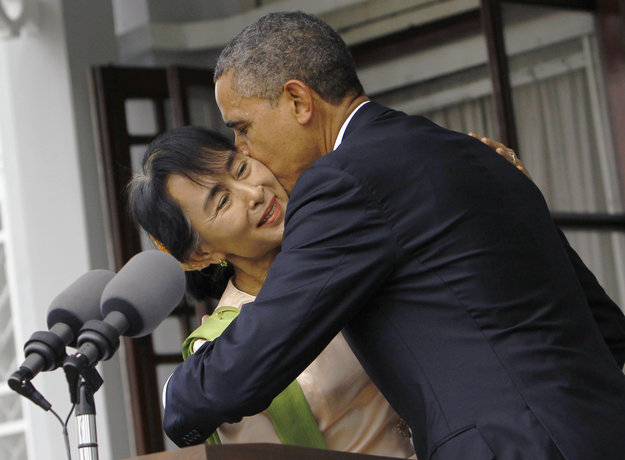The United States on Monday welcomed Burma’s election as a victory for the people, and the vote appeared to raise prospects of a further lifting of US sanctions – provided the military accepts the results.
While highlighting encouraging signs from Sunday’s poll, Washington remained cautious and said it would watch for the democratic process to move forward before lifting more sanctions, which still target more than 100 individuals and businesses and limits US investment in Burma.
The opposition National League for Democracy (NLD), led by figurehead Aung San Suu Kyi appeared on course for a landslide victory that could ensure it forms the next government.
White House spokesman Josh Earnest said the election process was encouraging and “represents an important step in Burma’s democratic process.”
“What is clear is that for the first time ever, millions of people in Burma voted in a meaningful, competitive election,” he said.
He said there were still flaws in the political system – including a constitutional provision barring Suu Kyi from becoming president because of her marriage to a foreigner – and that it was too soon to discuss US policy changes.
The top US diplomat for Asia said preliminary indications were that the elections went “quite smoothly,” but a “credible” transition was now needed.
Daniel Russel, US assistant secretary of state for East Asia, said that after 50 years of military dictatorship, “this was a hell of a step forward for the democratic process,” but added: “Now comes the hard part.”
Russel said it was too early to evaluate the overall conduct of the voting, or say whether it could lead to a lifting of remaining US sanctions.
“The further the process of reform moves, the more credible and respectable the political process is, the greater the support and the lower the hurdles for the US government, and I suspect other governments, to actively support a new Burmese government, including through adjustments to our policies.”
The US officials said Burma’s president and military leadership had publicly reaffirmed that they would accept the election results.
“The United States, and I believe other members of the international community, have every intention of holding them to that,” Russel said.
MILITARY IGNORED LAST ELECTION
Suu Kyi’s NLD won Burma’s 1990 election by a landslide, but the military ignored the result.
Washington and the European Union suspended most economic sanctions on Burma after the formation of a quasi-civilian government in 2011.
The United States is keen to expand relations with Burma as part of an effort to counteract China’s rise in Asia and take advantage of the opening of one of the world’s last “frontier markets”.
But President Barack Obama’s administration and influential members of Congress still have serious concerns about human rights, including the treatment of minority Rohingya Muslims.
[related]
The sanctions blacklist, which includes some of Burma’s biggest business players – has restricted US investment, which US diplomats see as crucial to maintaining influence in the country.
Bilateral trade rose to over $185 million last year from less than $10 million in 2010, but that is still a tiny fraction of Burma’s total trade of more than $27 billion, primarily dominated by Asian partners.
US shipments to Burma have slowed to a crawl in recent months after several banks, including Citigroup, Bank of America, HSBC and PNC Financial, curtailed financial backing of trade with the country, according to sanctions lawyers and others familiar with the matter.
They said banks cut the financing after learning that part of Burma’s main port was controlled by Steven Law, a man blacklisted by Washington because of alleged ties to the military.
Peter Kucik, a former senior sanctions adviser at the US Treasury, said that if Burma’s transition proceeded smoothly, US officials would likely try to expedite the de-listing process and issue more legal workarounds to get US business flowing.
“They are going to have to make sure people can see the light at the end of the tunnel,” he said.
Jose W. Fernandez, a former assistant secretary of state and the architect of U.S. sanctions policy on Burma, said military officials and their allies would have the opportunity to get off the blacklist “as a reward for democratic behavior.”
“These are people that long wanted to get off the US list,” he said. “The attention of the US government is going to be spot-on. So it’s going to be easier for any good behavior to be noticed by the US government.”
Read the full 2015 election coverage here.



